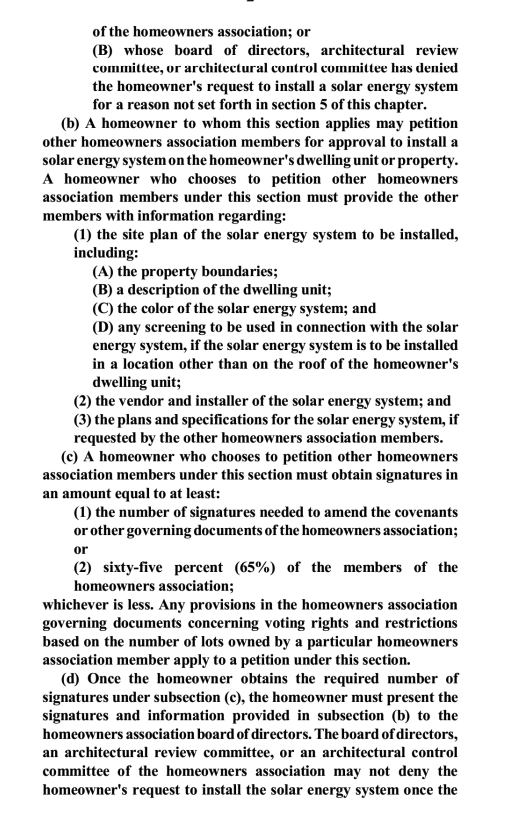How it Works
Indiana homeowners associations generally fall into one of two camps:
1. Those whose covenants prohibit solar systems outright, and
2. Those whose covenants subject installation of solar systems to the discretion of the board or an architectural committee.
Association boards in the latter category may adopt guidelines as to location, style, type, color and other aesthetic factors.
Under the new law, if an owner cannot install solar panels either because of a prohibition in the covenants or a limitation in Association-adopted guidelines, the owner can petition the Association’s members to overcome those limitations.
To successfully do so, the owner must collect signed consents from the lesser of 65% of the Association’s members or the amount necessary to amend the covenants.
For example, if the approval requirement to amend the community’s covenants is 75% of the owners, the petitioning owner would need to gather signatures from only 65% of the members, as this is the “lesser” amount.
If, on the other hand, the covenants can be amended by a majority of the owners, the homeowner would need consents from a majority of members to install the solar system, not 65%.
Indiana HOA boards of directors should ensure they understand what is required to amend the covenants, as this will dictate the homeowner’s rights under the new law.
In gathering consents, the homeowner must provide the Association’s members with the following information:
• The site plan of the solar energy system to be installed, including:
• The property boundaries;
• A description of the dwelling;
• The color of the solar energy system; and
• Any screening to be used, if the solar energy system is to be installed in a location other than on the roof of the dwelling.
• The vendor and installer of the solar energy system.
• The plans and specifications for the solar energy system, if requested by the other Association members.
If a homeowner successfully obtains the required consents, the board must permit installation unless one of the following conditions apply:
• The solar system threatens public health or safety, or violates a law (the statute does not clarify what exactly might violate “public health or safety.”).
• The system would be installed on property owned or maintained by the Association.
• The system would be installed in a location other than:
• The roof of (1) the dwelling; or (2) another structure approved by the Association; or
• A fenced yard or patio owned and maintained by the owner.
• The system would be mounted on the roof of the dwelling, and:
• It would extend above or beyond the roof by more than six (6) inches;
• It would not conform to the slope of the roof and would have a top edge that is not parallel to the roof line; or
• It would have a frame, support bracket, or visible piping or wiring that is not in a silver, bronze, or black tone commonly available in the marketplace.
• The system would be installed in a fenced yard or patio rather than on the roof and would be taller than the fence line.
• The manner of installation would void material warranties.
• The system is installed in a manner differing significantly from what was presented to the homeowners and/or the board.
What Should Boards Do?
Indiana homeowners association boards should implement procedures applicable to solar systems and adopt solar policies, factoring in the new legal requirements. The contents of a policy will vary, depending on the requirements of the community’s covenants and the characteristics of the community.
In communities where solar is within the board’s discretion, a policy could outline criteria the board will apply in reviewing an owner’s request.
Guidelines should be reasonable in nature and should focus on aesthetic factors such as style, type, size and screening. The policy also could describe the owner’s right to petition the members if he or she deems the board’s guidelines too restrictive, as well as the procedures the owner must follow. In communities with covenants prohibiting solar systems outright, a policy could describe the owner’s rights under the law to circumvent the restriction by petitioning the other members.
A clear written policy minimizes confusion, ensures consistency and provides a roadmap for legal compliance. Though there is no legal requirement to do so, we believe a solar policy should be recorded with the county recorder’s office to put both current and future owners on notice.
Indiana HOA boards wanting to adopt such a policy should work with their homeowners association’s attorney to do so.
A Note on Condos and Townhomes
A homeowner’s right to petition the members does not apply to situations where a solar system would be installed on property that is either owned or maintained by the Association. Thus, condominium associations and other types of communities where the Association either owns or maintains the exterior of homes – including the roofs – will not be subject to the new law.




